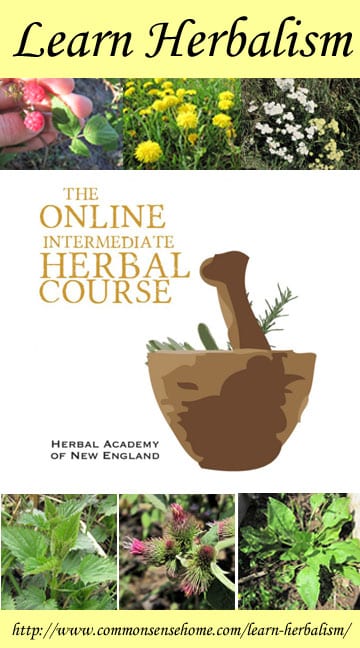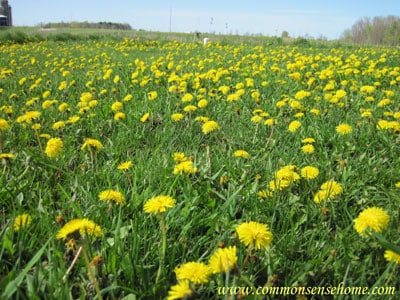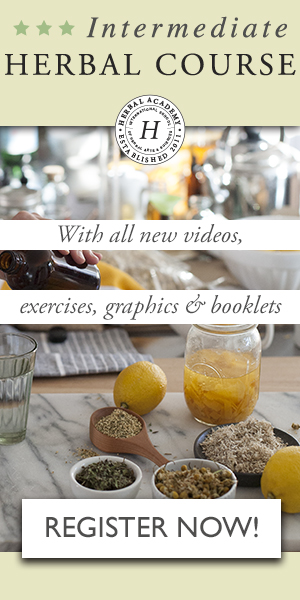Learn Herbalism with the Herbal Academy
This post may contain affiliate links. Read my full disclosure here.
Those of you who have been around for a bit know that I am a plant person. I have big garden, and have firmly embraced wildcrafting (learning to use wild plants for food and medicine). What I haven’t had is a formal opportunity to learn herbalism. Other than some interesting conversations with the neighbors about how to put some of their weeds to use, there simply aren’t many herby people nearby. One of my wildcrafting mentors passed away, and the other moved out of state, so I’m back on my own again.

I’ve looked into some formal herbalism training. Besides not being nearby, what I found was prohibitively expensive. I don’t need really heavy duty training – I just want to be able to take care of my family and friends and share more basic herbal remedies with others.
Then I found the Herbal Academy. Those of you who follow Common Sense Home on Facebook have likely seen some of their articles. I was given the opportunity to go through their herbal course at a discount in return for sharing my experience with all of you.
Learn Herbalism Online with the Intermediate Herbal Course
The Online Intermediate Herbal Course is intended for students with some herbal training (community herbal classes, workshops, self-study), but even if you’re brand new to herbalism, they’ll be reviewing some basic concepts in the first unit to set the foundation.
If you’ve never worked with herbs at all, you’re probably better off starting here on Common Sense Home, reading and working through the Herbs and Wildcrafting articles before tackling the course.
So what’s covered in the course?
The Intermediate Herbal Course: 10 Unit Outline
Unit 1: Why Herbs And How They Work
History; Herbal Healing Philosophies; Homeostasis; Overview of Body Systems; Systems of Energetics, Actions and Constitutions; Medicine Making Review; Side Effects and Safety; Creating Formulations
Unit 2: Food is Medicine
Kitchen Cupboard Herbs; Vinegars; Oils; Honey; Edible and Medicinal Plants; Foraging; Wild crafting; Plant Savers; Gratitude and Ceremony
Unit 3: Digestive System
Alimentary System Overview; Digestive Health as Foundation of Health; Imbalances of the Digestive System and Herbal Remedies
Unit 4: Immune System
Building Immune Health; Prevention; Common Disharmonies; Creating a Materia Medica
Unit 5: Nervous System
The Central Nervous System; The Peripheral Nervous System; The Enteric Nervous System; Stress; Headaches; Sleep; Herbs
Unit 6: Cardiovascular
Anatomy of the Heart; Blood Pressure; Cholesterol; Heart Strong/Heart Health; Herbal Therapeutics; Diet; Glycosides; The Energetic Heart
Unit 7: The Liver
Anatomical Overview; Liver Health; Liver Imbalances; Herbal Treatments; Bitters
Unit 8: Respiratory
Breathing; Asthma; Lung Imbalances; Herbal Tonics; Natural Remedies
Unit 9: Urinary System
Kidney and Urinary Health; UTI; Herbs
Unit 10: Children
Common Discomforts; Formulas and Recipes; Which Herbs are Safe; Dosing

The units are broken up into lessons, and there is a quiz at the end of each unit before moving on to the next unit.
Highlights of the course include:
- Over 100 herbal recipes
- Interactive ebooks
- Printable handouts and charts
- Videos throughout every unit
- Online forums open for discussion and questions
- Easy access to a team of herbalists and medical professionals
- Printable Intermediate Herbal Certification upon completion
I’m specifically looking forward to Unit 2, because I already enjoy foraging and wildcrafting; and Units 3 and 4, because I know my immune system is out of whack and your immune system is tied directly to your digestive system. I also want learn more about the liver, heart and lungs for various friends and family members.
How much does it cost?
The full Online Intermediate Herbal Course cost is $360. The average student will take around one month per unit to complete the course (there’s a lot of information included). This can be divided into three payments paid during the first three months. It’s not inexpensive, but it’s a lot less expensive than many other options I’ve found, and the money saved being able to help yourself can add up very quickly.
What do I need to take the course?
Would you like to save this?
Recommended books and materials that may be helpful.
Books:
Botany in a Day
By: Thomas J. Elpel
Medical Herbalism
By: David Hoffman
Adaptogens: Herbs for Strength, Stamina and Stress Relief
By: David Winston
Nutritional Herbology: A Reference Guide to Herbs
By: Mark Pederson
The Practice of Traditional Western Herbalism: Basic Doctrine, Energetics, and Classification
By: Matthew Wood
The Web That Has No Weaver: Understanding Chinese Medicine
By: Ted J. Kaptchuk
Healing with Whole Foods: Asian Traditions and Modern Nutrition
By: Paul Pitchford
The Yoga of Herbs: An Ayurvedic Guide to Herbal Medicine
By: David Frawley and Vasant Lad
The Lost Language of Plants: The Ecological Importance of Plant Medicines for Life on Earth
By: Stephen Harrod Buhner
Making Plant Medicine
By: Rico Cech
Supplies:
8 oz. mason jars, cheese cloth, strainer, large bowls, funnel, small 1 or 2 oz. bottles, raw wildflower honey, apple cider vinegar, high proof brandy or vodka, natural waxed paper
For herbs, The Herbal Academy recommend these websites for ordering:
Bulk Herb Store (also for bottles, etc.)
Mountain Rose Herbs (also for bottles, etc.)
Frontier
Zack Wood Farms
Jean’s Greens
For herbal products (tinctures)
Herbalist Alchemist
Herb Pharm
Gaia Herbs
Urban Moonshine (bitters)
There are hundreds of recipes in this program. This means many herbs to learn about. You will be asked to practice and share your experience working on one of the recipes for each unit.
Suggested Herbs For Tea and Other Recipes:
- Nettles
- Lemon balm
- Chamomile
- Raspberry leaf
- Dandelion
- St. John’s wort
- Licorice
- Peppermint
- Motherwort
Other herbs featured in the program – which ones would you like to try? Add them to your order or your garden.
- Angelica root
- Bee balm
- Burdock root
- Calendula
- Cardamom pods
- Cayenne
- Cinnamon
- Elderberry
- Fennel seeds
- Gentian root
- Hawthorn berries
- Hyssop
- Lavender
- Linden flower
- Marshmallow root
- Meadowsweet
- Passionflower
- Plantain leaf
- Reishi
- Rose petal
- Rosemary
- Sage
- Thyme
- Tulsi (Holy basil)
- Tumeric
- Valerian
- Wood betony
- Yarrow
- Yellow dock root
If you’d like to learn more about the course, just click on the link below.

